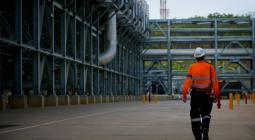Australia accused of ‘exporting climate destruction’ on tiny Pacific neighbours with massive gas expansion plans
Labor government ‘not acting in good faith’ when it stands on global stage and promotes its climate credentials, special envoy at Cop29 says
Pacific governments at a UN climate summit are criticising Australia’s plans for a massive gas industry expansion in Western Australia, saying it could result in 125 times more greenhouse gas emissions than their island nations release in a year.
As the Cop29 summit in the Azerbaijani capital of Baku begins its second week, representatives from Vanuatu and Tuvalu have called on Australia to stop approving new fossil fuel developments, including a proposal to extend the life of Woodside’s North West Shelf gas facility until 2070.
Ralph Regenvanu, Vanuatu’s special envoy for climate change, said Australia was “not acting in good faith” when it stood alongside Pacific leaders on the global stage and promoted its climate credentials while continuing to approve coal and gas projects.
“As the world’s third largest fossil fuel exporter, the Australian government is exporting climate destruction overseas, including to Pacific nations like Vanuatu, who experience the most devastating impacts of the climate crisis, despite contributing the least,” he said. “This is climate injustice.”
Regenvanu urged Australia to do more to address accelerating climate impacts and back up an agreement at the Cop28 summit in Dubai last year that the world needed to transition away from fossil fuels.
Maina Talia, Tuvalu’s climate change minister, said pursuing efforts to limit global heating to an average 1.5C – a headline goal of the landmark 2015 Paris climate deal – was “not just a number” but a “lifeline for Pacific communities facing rising seas, accelerating extreme weather disasters and the erosion of our cultures”.
“We will continue to keep industrialised countries accountable for their actions,” he said. “Our future lies solely in their hands.”
Australia’s climate change minister, Chris Bowen, arrived in Baku on Saturday for the ministerial section of the fortnight-long talks. He is co-leading what is considered the most important stream of negotiations, which aim to develop a new global climate finance goal to help developing countries. Analysis from a group of respected economists has found it should be US$1tn a year by 2030.
Bowen is also lobbying for Australia to co-host the Cop31 climate summit in 2026 in partnership with Pacific countries. Australia is competing with Turkey to host the event. Bowen detoured to the Turkish capital of Ankara en route to Azerbaijan for meetings to try to reach agreement in the consensus-based decision-making process on where the summit will be held. Turkey later said it planned to continue with its campaign.
Pacific leaders are largely supporting the Australia bid for what has been described as “the Pacific Cop”, and have argued it should focus on lifting commitments to cut emissions and support the most vulnerable in the region. Their comments, including by the leaders of Tonga and Palau last week, have highlighted the renewed pressure that will come on Australia to act on fossil fuel exports if it is successful.
Speaking in Azerbaijan, Talia said a partnership between Australia and Pacific nations to co-host Cop31 would be “an exciting opportunity to accelerate ambitious climate action in our region” but “a commitment to end new fossil fuels must lie at the heart of this”. “That means no new coal and gas, and a fair, fast phase-out of all fossil fuels,” Talia said.
Activists say emissions from the gas processed at the plant on the Burrup Hub, in WA’s north, could result in up to 6bn tonnes of emissions once it was exported and burned overseas. The Australian government also approved an expansion of three thermal coalmines that could lead to more than 1bn tonnes of emissions when the fuel is burned.
Bowen told Guardian Australia he agreed the biggest impact Australia could have on the climate was to replace fossil fuel exports with renewable energy exports, and argued the country was aiming to become a “renewable energy superpower”, but said it was a big task that would take time. He said cutting off fossil fuel supply before there were replacements and while others still exported coal and gas was “not the way you get this job done”.
On Friday, the Australia government said it was committing $125m to improving energy security and power grid transition in the Pacific. Bowen said: “Each step we take to fight climate change is a step back from the brink, and Australia is dedicated to working with our Pacific neighbours to make sure our next steps are the right ones.”
An assessment of Australia’s climate performance by Climate Action Tracker last week rated the country’s commitments as “insufficient” to live up to what it should be doing to play its part in responding to the climate crisis. It found Australia’s finance commitments were “critically insufficient”.
The analysis said Australia had introduced several measures aimed at stimulating investment in renewable energy and clean industries but also doubled down on fossil fuels. Bill Hare, from Climate Action Tracker, said emissions within the country from fossil fuels were “flatlining”, but this had been masked by changes in government estimates of emissions from forests.
Shiva Gounden, from Greenpeace Australia Pacific, said Australia would “be judged by its actions, not its words”.
“To be a true partner of the Pacific, we ask the government to genuinely respond to Pacific needs. This means a fair share of contributions to the Loss and Damage fund, ending fossil fuel approvals and subsidies, and accelerating much-needed climate finance,” he said.
Cover photo: The low-lying South Pacific island nation of Tuvalu, home to about 11,000 people, is extremely vulnerable to climate change. Photograph: Sean Gallagher/The Guardian




